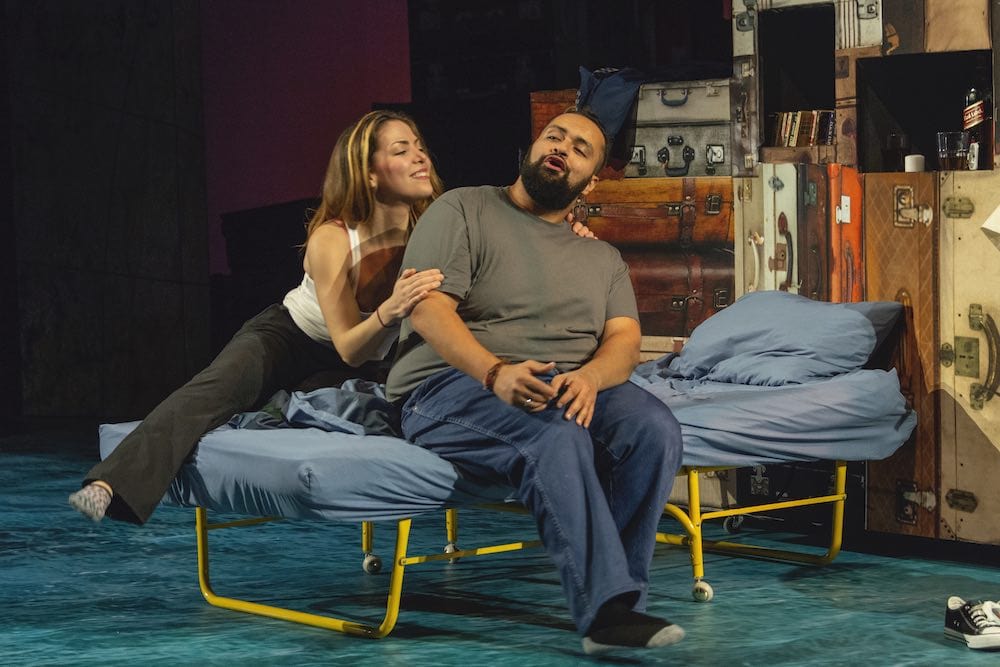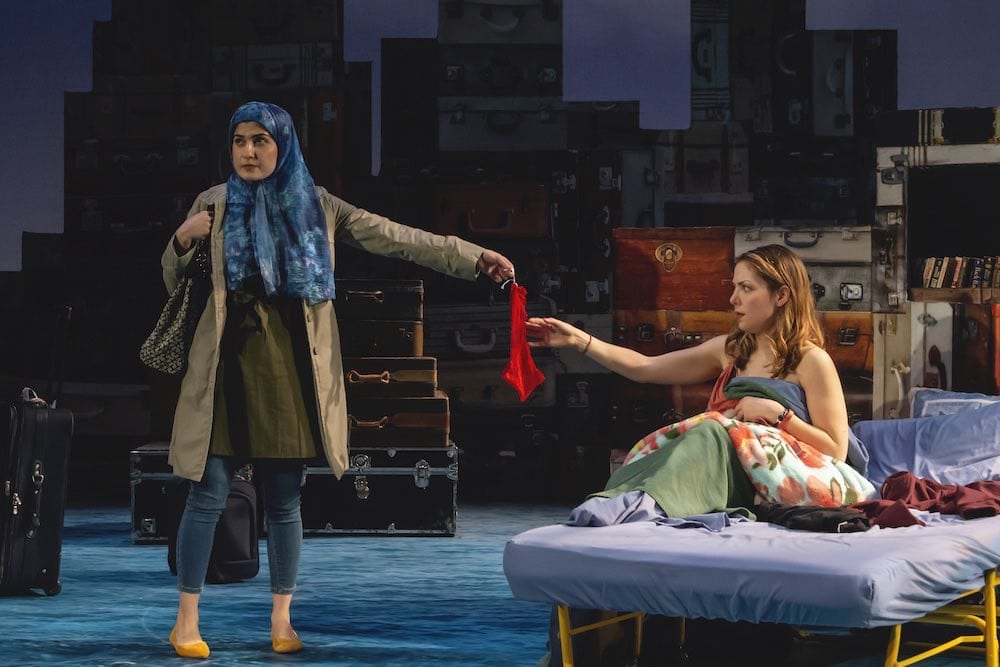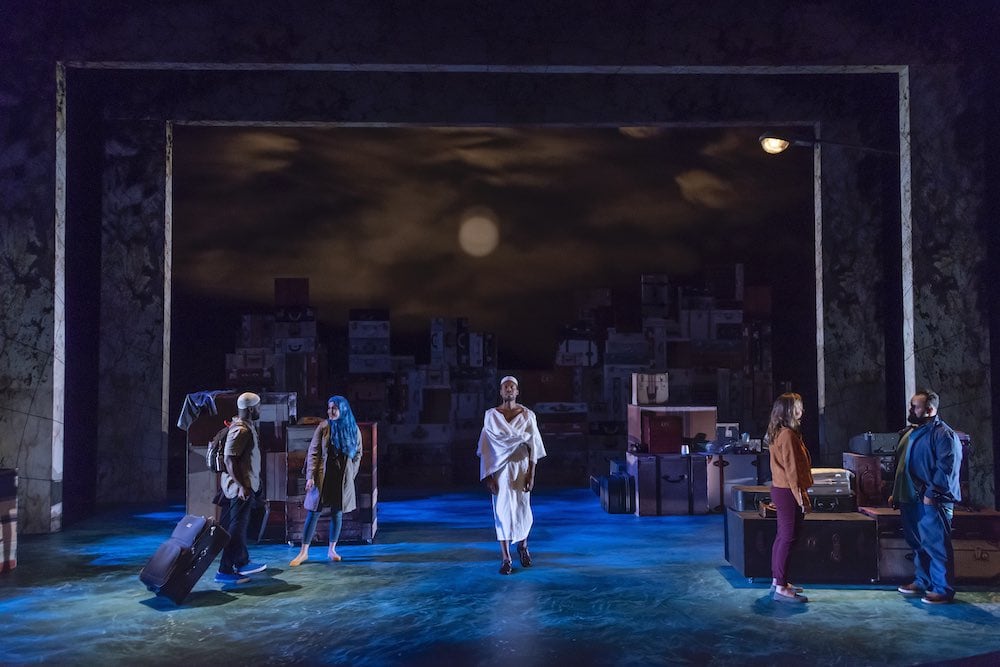This thoroughly delightful offering from Mosaic Theater Company has all the makings of a lighthearted rom-com. Boy picks up girl. He invites her to his place. She initiates sex. It’s hot. Though they come from different backgrounds, they click. He’s shy and old school. She’s forward and modern. But hot is hot and love is love and they fall for each other, hard. Then his old-school fiancée shows up. Oops.

True to Mosaic’s worthy mission, this rom-com has a higher purpose. Programmed as part of Mosaic’s estimable Voices from a Changing Middle East Festival, this briskly witty comedy is, in Artistic Director Ari Roth’s words, “a romantic fable” about “intercultural union.” Specifically, Pilgrims Musa and Sheri in the New World, which is set in the present in an American city, is about the cross-cultural romance between Musa (Ahmad Kamal), an earnest, reticent Muslim cab-driver born in Egypt, and Sheri (Rachel Felstein), a frisky, do-me waitress born in America. By the end of Act One, their cross-cultural coupling is complicated by the surprise return from Egypt of Gamila (Sanam Laila Hashemi), Musa’s sensibly modest Muslim betrothed.

This rom-com thus is freighted with some important and intriguing baggage about identity and immigration—a theme evoked in Nephelie Andonyadis’s apt set, which is stacked high with luggage as though on a navigable blue sea.
READ Ravelle Brickman’s review, “Channeling chutzpah in ‘Pilgrims Musa and Sheri in the New World.'”
Playwright Yussef El Guindi—himself born in Egypt and now based in Seattle—knows how to entertain with sparkling repartee and tease with the sort of sexy stuff that calls for a skilled intimacy consultant (in this case, Claudia Rosales Waters). But El Guindi also keeps focus on the larger issues of identity, integrity, and cross-cultural connecting that his play wants to point to.
For instance, Musa’s buddy Tayyib (Gerrad Alex Taylor), a clever Egyptian-born luggage merchant, gives Musa a serious admonition about hooking up with Sheri:
TAYYIB: Musa: you can not be a foreigner twice in this country. When you are out here, you are a foreigner, but when you go home, you must be allowed to hang up your foreigner hat and be yourself. Do not mistake the woman who gives you pleasure with the woman who will surround you with things that feed you…. Gamila is a beautiful woman. She will make you feel at home. And without this home, this country will eat you up little by little.
Musa, for his part, makes the case to Gamila for his newfound sensual assimilation:
MUSA: You want to keep in touch with your roots? I don’t want roots! I want things I know nothing about. I want a life where I don’t know where it goes. With us, the story it would be—it would be very clear—and customs and tradition and family; and this is who we are and where we started and this is where we are going. All the way to when they bury me. I don’t want the rest of my life to be what I know. This story where I know beginning, middle and end. Yes, Sheri is not you. She is very strange and perhaps wrong for me, but maybe that is what I need. The wrong woman. Maybe I need the wrong woman in my life.
Meanwhile Sheri, quite perplexed by it all, offers this wry observation:
SHERI: What is it with this—needing to stick with one’s own? I don’t get it. Doesn’t that make the world an even smaller place?
I will admit that for me the play’s rom-com form did not support all the larger meaning it meant to. The merry metaphors of sexual attraction as international exchange and sex itself as cross-cultural merger seemed awkwardly inattentive to the many ways that any heterosexual congress is already about a man and a woman from different cultures. Which is to say, the script felt more conversant with men’s culture than with women’s. Director Shirley Serotsky has dealt with this gendered imbalance artfully, and Felstein’s performance of Sheri was excellent. Still, the role of Sheri as written seemed more a conventional male projection than a credible character in her own right. And in that sense the play felt not as woke as it wished to be.

That said, there are passages in the play that soar and seem to transcend all borders. For instance, there’s a speech near the end by Musa’s devout Muslim roommate, Abdallah (Freddie Lee Bennett), who went on a pilgrimage to Mecca but drowned on the way home when his ship sank. Wearing a traditional white gown and cap, Abdallah appears unseen by the others and delivers a prayerlike monologue so moving one could choke up at the beauty of it:
ABDALLAH: One more look. Before my body washes ashore and they bury me. Before they find my suitcase floating and identify me. Look where my memory—my spirit, takes me. To this place. To the struggles I had here. I went—I traveled to give thanks. To walk with strangers gathered for something. To walk in what I knew would be a crush of too many people gathered to give thanks. A coming together. Of people from everywhere; with different tongues and looks and ways of seeing things. And for all of us to remember a time before we were—before we were strangers to each other….
Abdallah is speaking literally of the Hajj, the gathering of Muslim pilgrims at Mecca. But in his moving words one can also hear a benedictory metaphor for the hope of global human harmony.
Running Time: Two hours 15 minutes, including one intermission
Pilgrims Musa and Sheri in the New World plays through February 16, 2020, presented by Mosaic Theater Company in the Lang Theater at the Atlas Performing Arts Center, 1333 H Street NE, Washington DC. For tickets, call (202) 399-7993 ext. 2 or go online.




